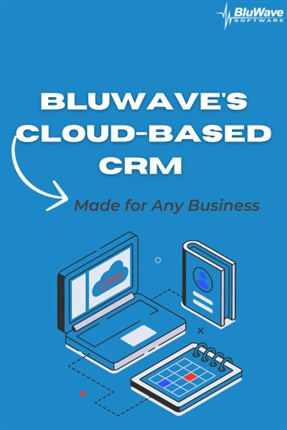
Customer relationship management (CRM) systems have become essential tools for managing interactions with customers and streamlining business processes. As companies increasingly adopt cloud-based solutions, cloud-based CRM systems have emerged as a popular choice due to their numerous benefits and adaptability. In this blog post, Let’s explore the advantages of cloud-based CRM and share best practices for modern businesses to increase their effectiveness.
Benefits of Cloud-Based CRM
Accessibility and Mobility:
BluWave’s Cloud-based CRM systems offer accessibility, allowing employees to access customer data from anywhere with an internet connection. This mobility ensures that sales teams, customer service representatives, and managers can stay connected and productive, even when working remotely or travelling.
Scalability:
One of the significant advantages of cloud-based CRM is its scalability. As your business grows, your CRM system can easily expand to accommodate more users and additional functionalities without the need for significant infrastructure investments. This flexibility makes it ideal for businesses of all sizes.
Cost-Effectiveness:
Cloud-based CRM solutions often come with lower upfront costs compared to traditional on-premises systems. Businesses can avoid expenses related to hardware, maintenance, and IT staff by opting for subscription-based pricing models, which can be more manageable and predictable.
Enhanced Security:
Leading cloud-based CRM providers invest heavily in security measures to protect customer data, including encryption, multi-factor authentication, and regular security audits. These robust security protocols often surpass what most businesses can achieve with their in-house systems.
Best Practices for Implementing Cloud-Based CRM
Define Clear Objectives:
Before implementing a cloud-based CRM, it's crucial to identify your business goals and how the CRM system will help achieve them. Whether it's improving customer service, increasing sales, or streamlining marketing efforts, having clear objectives will guide your CRM strategy.
Train Your Team:
Comprehensive training is crucial for successful CRM implementation. Ensure that all users understand the system's features and how to use them effectively. Ongoing training sessions can help keep the team updated on new features and best practices.
Ensure Data Quality:
Data quality is fundamental to the success of any CRM system. Regularly clean and update your customer data to ensure accuracy and reliability. Implementing data validation rules and duplicate detection can help maintain data integrity.
Cloud-based CRM systems offer modern businesses a versatile and efficient way to manage customer relationships and drive growth. By leveraging the benefits of accessibility, scalability, cost-effectiveness, and integration capabilities, businesses can enhance their operations and customer interactions. Implementing best practices such as defining clear objectives, choosing the right vendor, and ensuring data quality will help increase the effectiveness of your cloud-based CRM system
![]()